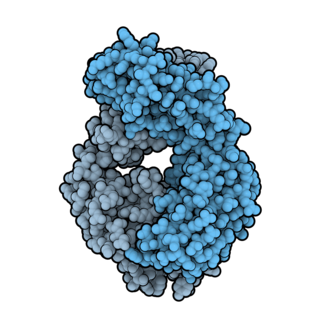
Infliximab, a chimeric monoclonal antibody, sold under the brand name Remicade among others, is a medication used to treat a number of autoimmune diseases. This includes Crohn's disease, ulcerative colitis, rheumatoid arthritis, ankylosing spondylitis, psoriasis, psoriatic arthritis, and Behçet's disease. It is given by slow injection into a vein, typically at six- to eight-week intervals.
An international nonproprietary name (INN) is an official generic and non-proprietary name given to a pharmaceutical drug or an active ingredient. INNs are intended to make communication more precise by providing a unique standard name for each active ingredient, to avoid prescribing errors. The INN system has been coordinated by the World Health Organization (WHO) since 1953.

Adalimumab, sold under the brand name Humira, among others is a monoclonal antibody used to treat rheumatoid arthritis, psoriatic arthritis, ankylosing spondylitis, Crohn's disease, ulcerative colitis, plaque psoriasis, hidradenitis suppurativa, uveitis, and juvenile idiopathic arthritis. It is administered by injection under the skin.
The nomenclature of monoclonal antibodies is a naming scheme for assigning generic, or nonproprietary, names to monoclonal antibodies. An antibody is a protein that is produced in B cells and used by the immune system of humans and other vertebrate animals to identify a specific foreign object like a bacterium or a virus. Monoclonal antibodies are those that were produced in identical cells, often artificially, and so share the same target object. They have a wide range of applications including medical uses.

Certolizumab pegol, sold under the brand name Cimzia, is a biologic medication for the treatment of Crohn's disease, rheumatoid arthritis, psoriatic arthritis and ankylosing spondylitis. It is a fragment of a monoclonal antibody specific to tumor necrosis factor alpha (TNF-α) and is manufactured by UCB.
Catumaxomab is a rat-mouse hybrid monoclonal antibody which is used to treat malignant ascites, a condition occurring in people with metastasizing cancer. It binds to antigens CD3 and EpCAM. It was developed by Fresenius Biotech and Trion Pharma (Germany).

Ofatumumab, sold under the brand name Arzerra among others, is a fully human monoclonal antibody to CD20, which appears to inhibit early-stage B lymphocyte activation. It is FDA approved for treating chronic lymphocytic leukemia that is refractory to fludarabine and alemtuzumab and for the treatment of multiple sclerosis. It has also shown potential in treating follicular lymphoma, diffuse large B cell lymphoma, rheumatoid arthritis. Ofatumumab is the first marketing application for an antibody produced by Genmab, as well as the first human monoclonal antibody which targets the CD20 molecule that will be available for patients with refractory CLL.
Pritumumab (PTB) is a human monoclonal antibody targeted against glioma. It works by binding to the ecto-domain of vimentin on the surface of cancer cells. developed by Nascent Biotech.
Efungumab was a drug developed by NeuTec Pharma, intended to treat candidemia in combination with amphotericin B. The European Medicines Agency has twice refused to grant marketing authorization for Mycograb, citing product safety and quality issues.
Vedolizumab, sold under the brand name Entyvio, is a monoclonal antibody medication developed by Millennium Pharmaceuticals, Inc. for the treatment of ulcerative colitis and Crohn's disease. It binds to integrin α4β7. Blocking the α4β7 integrin results in gut-selective anti-inflammatory activity.
Tanezumab is a monoclonal antibody against nerve growth factor as a treatment for pain. Tanezumab was discovered and developed by Rinat Neuroscience and was acquired by Pfizer in 2006.
Olaratumab, sold under the brand name Lartruvo, is a monoclonal antibody medication developed by Eli Lilly and Company for the treatment of solid tumors. It is directed against the platelet-derived growth factor receptor alpha.

Tralokinumab sold under the brand name Adtralza among others, is a human monoclonal antibody used for the treatment of atopic dermatitis. Tralokinumab targets the cytokine interleukin 13.
Drug nomenclature is the systematic naming of drugs, especially pharmaceutical drugs. In the majority of circumstances, drugs have 3 types of names: chemical names, the most important of which is the IUPAC name; generic or nonproprietary names, the most important of which are the International Nonproprietary Names (INNs); and trade names, which are brand names. Under the INN system, generic names for drugs are constructed out of affixes and stems that classify the drugs into useful categories while keeping related names distinguishable. A marketed drug might also have a company code or compound code.
Enfortumab vedotin, sold under the brand name Padcev, is an antibody-drug conjugate designed for the treatment of cancer expressing Nectin-4. Enfortumab refers to the monoclonal antibody part, and vedotin refers to the payload drug (MMAE) and the linker.
Fremanezumab, sold under the brand name Ajovy, is a medication used to prevent migraines in adults. It is given by injection under the skin.
Ravulizumab, sold under the brand name Ultomiris, is a humanized monoclonal antibody complement inhibitor medication designed for the treatment of paroxysmal nocturnal hemoglobinuria (PNH) and atypical hemolytic uremic syndrome. It is designed to bind to and prevent the activation of Complement component 5 (C5).
Bamlanivimab is a monoclonal antibody developed by AbCellera Biologics and Eli Lilly as a treatment for COVID-19. The medication was granted an emergency use authorization (EUA) by the US Food and Drug Administration (FDA) in November 2020, and the EUA was revoked in April 2021.
Regdanvimab, sold under the brand name Regkirona, is a human monoclonal antibody used for the treatment of COVID-19. The antibody is directed against the spike protein of SARS-CoV-2. It is developed by Celltrion. The medicine is given by infusion (drip) into a vein.
Amivantamab, sold under the brand name Rybrevant, is a bispecific antibody medication used to treat non-small cell lung cancer.




